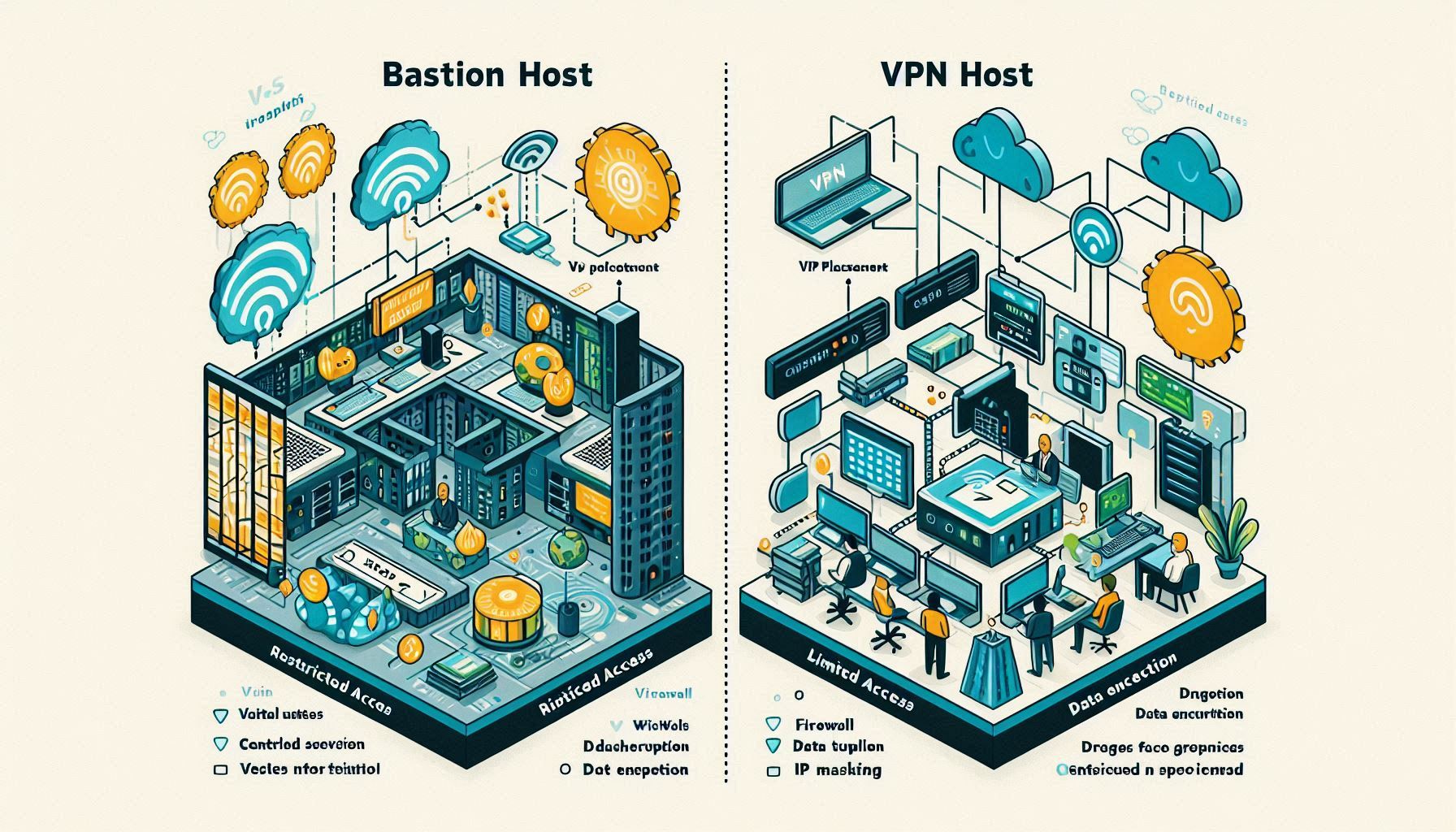Bastion Host vs. VPN Host: Key Differences and Why They Matter for Security

According to NIST’s Guide to Security Architecture, network security is a foundational element for safeguarding digital assets, and understanding different security architectures can significantly enhance protection against cyber threats.
Cyber security really has become important more than ever in today’s fast changing digital world, as more and more organizations and people seek to secure their computer networks. Two general forms of network access control mechanisms include the Bastion Host and VPN Host. Both serve important functions for protection of access but are developed with different objectives and consider different facets of network protection.
A Bastion Hosts are specialized secure entry points to a more secure network and offer user interfaces for management systems while VPN Hosts offer secure encrypted links more so to mobile users. This knowledge is necessary in order to select the proper solution for various security requirements.
The differentiation between Bastion Hosts and VPN Hosts should be made to better understand how security can be achieved. If utilized correctly, you can use those tools effectively in managing your network environment while providing the protection that you need.
There is nothing new that we can explain about them, as their definition, functions, advantages, and specific uses, are already very well expressed in the literature: in this article, we will just provide you with the knowledge about them that you need in order to make informed security decisions.
What is a Bastion Host?
Bastion host is defined as a computer that has a very important role on a network and this computer holds the fort between an organizations internal network and the external world usually the internet.
This server is an added security process and is frequently located in a DMZ or in some other isolated area so that it can monitor access to other network assets. Its main function is to monitor the high risk network segments, and it serves as a secure gateway for any user who requires a limited access of an organizations’ networks.
Due to constant threat from outsiders, the bastion host is largely left with a few services that serve to decrease chances of being breached. This simply means that only the most important and well protected functions are available, thereby making the first level of defense for the network strong.
Core Functions
The core functions of a bastion host include:
- Restricted Access: Some instances are implemented as bastion hosts which only allow a restricted number of users like the network administrators full access. They have multiple factor login and may, in addition, employ other forms of security to enhance the user’s identity.
- Firewall Integration: Additional firewalls can be located in front of the bastion hosts so that the final decision on the incoming traffic admission is made by two or more machines. Such a setup establishes a controlled pathway through which all incoming and outgoing traffic has to flow.
- Minimal Service Exposure: Bastion host is usually set up with only core services running so any hacker is likely to have limited grounds to breach.
- Logging and Monitoring: Bastion hosts also keep records of all the accesses and activities to and on the hosts, thus detailed audited can be conducted on any suspected security threats.
Bastion hosts are maintained only for necessary access and controlled strictly to ensure that an intruder cannot easily make their way in because they are essentially a fortified access point.
Common Use Cases
Bastion hosts are especially useful in the following scenarios:
- High-Security Internal Networks: In organisations where internal information is relatively sensitive, the bastion host acts like a gateway through which only the system managers are allowed to pass. It is particularly applicable in banks and other financial institutions, government offices, and health care organizations whose business critically depends on security of information.
- Controlled Third-Party Access: Bastion hosts are also typically used to allow third party contractors to gain entry to systems such as for remote IT staffing or remote services, while allowing them access to only a bastion host and not everything else on the internal network.
- Cloud Environments: In cloud based architectures (like AWS or Azure), the bastion host is used to provide control points for systems administrators to connect to VPN or private cloud environments. These hosts help to make sure that only the relating and trusted users are the only ones who can get to related data or the management of the sites.
Bastion hosts are used in many networks as strong security element and tap the access to the valuable resources carefully.
What is a VPN Host?
A VPN Host is defined as a server or device that is specially programmed to support the Virtual Private Network or VPN for clients over insecure networks. Fundamentally, VPN host provides service in establishment of secure ‘ ‘tunnel ” from the user’s device to the destination network to prevent data interception or unauthorized access.
In this case, VPN hosts play a significant role of encrypting data in transit hence helps a lot in enabling privacy and security when accessing pertinent information through open networks like Wi-Fi freely available in cafés, airports or hotels among others.
While a bastion host allows only access to the internal network, VPN host is primarily intended to offer private connection through public networks. More specifically, it is rather helpful for the users who have to search for the required materials working from the distance, as well as for those, who require great confidentiality and protection of their personal information.
Core Functions
VPN hosts leverage a range of technologies to provide secure connections, including:
- Encryption: A VPN host employs an encryption or code system (like AES-256, L2TP/IPsec, and OpenVPN) to encode data to ensure that anybody who intercepts it will not understand it. Although encryption only makes the content of the communication secure for the end recipient, it is an essential measure in data security.
- Tunneling Protocols: VPNs employ tunneling protocols just like the PPTP, L2TP, the OpenVPN etc to encapsulate the data packets with a plus that they get to move through the public domain on the internet. This forms what can be referred to as a tunnel where the user’s device communicates with the VPN host while the data transits is protected from other people.
- IP Address Masking: A VPN host can disguise the user’s actual IP address and Allocated an IP address from the VPN server that helps to hide the user’s actual location. This mean that one can have better anonymity and can reach geographic content that may be blocked in some region.
- Authentication and Access Control: VPN hosts may need authorization to allow only those users in the network regarding their identity employing certain mechanisms some of them include username and pass words, numerous factor authentication and digital certificates.
VPN hosts provide an encrypted tunnel using encryption, tunneling, and access controls and provides a secure browsing area, communication, and remote access.
Common Use Cases
VPN hosts are widely used in several scenarios, including:
- Remote Work: VPN hosts enable a worker to safely connect their machine to his company’s system from home or other stations. Such connections owning to this software help to maintain and secure company’s information from leakages when operating from remote locations.
- Secure Data Transfer: A VPN-based host can serve the beneficial purpose for an individual organization or a more data transfer intensive organization since it offers the means of providing a secure platform in contrast to facing risk of data theft over insecure public networks.
- Accessing Geo-Restricted Content: VPN hosts are something which is liked by user those who agreed to access regional restricted content. This way the connection goes through any of the VPN servers in the user’s chosen geolocation to unblock streaming services, websites, or services.
- Enhanced Privacy and Anonymity: Users who want to protect themselves and their data from third parties use VPN to hide their activities, prevent surveillance and control third parties (like ISP).
VPN hosts are suited for use in cases of need for high privacy of data and information, ability to access networks from remote locations and spread geographically while offering users an encrypted pathway for use of all the networks.
Key Differences Between Bastion Hosts and VPN Hosts
The differences between Bastion Hosts and VPN Hosts, here is a comparison table and chart:
Security Comparison Table
| Feature | Bastion Host | VPN Host |
|---|---|---|
| Primary Purpose | Acts as a secure gateway to access specific, internal network resources | Provides secure, encrypted remote access over public networks |
| Security Focus | Access control with multi-factor authentication, firewall rules | Data encryption, tunneling protocols, IP masking |
| Access Levels | Limited to network administrators and specific users | Available to remote users and employees for secure data access |
| Network Placement | Positioned in a DMZ or isolated network area for controlled access | Connects users from any internet network to the internal network securely |
| Use Cases | High-security internal access, server management, controlled third-party access | Secure remote work, secure file transfer, accessing geo-restricted content |
| Authentication | Typically uses strict access controls with multi-factor authentication | Multi-factor authentication and VPN credentials |
| Data Encryption | Limited encryption (often reliant on firewall security) | Strong encryption protocols like AES-256 for secure data transmission |
| Scalability | Limited to specific users with high-security clearance | Scalable to large numbers of remote users, suitable for global access |
| Performance Impact | Minimal impact; only authenticates users before granting access | May reduce internet speed slightly due to encryption processes |
Functionality Comparison Chart
| Aspect | Bastion Host Role | VPN Host Role |
|---|---|---|
| Network Control | Acts as a controlled access point | Provides a secure pathway for remote access |
| Security Gateway | Monitors and controls access for administrators | Encrypts and protects data in transit |
| Traffic Direction | One-way access to specific internal servers | Bidirectional, secure tunnel for data flow |
| Operational Focus | Focuses on access management and limiting exposure | Focuses on secure data transfer and privacy |
| Main Technology | Firewalls, restricted services | Encryption, tunneling, IP masking |
Security Risks and Mitigations
It is important to understand the possibility of risks for the bastion and VPN hosts, along with the ways of preventing it as successfully as possible. Below is a summary of the major risks associated with each and the advised course of action on each of them.
Bastion Host Risks
- Misconfiguration
Risk: For example, a misconfiguration that occurs in a bastion host can cause the offering of more open services than desirable, or the erosion of suitable firewall controls.
Mitigation: Before proceeding make certain that the bastion host only runs required services, and analyze firewall settings to minimize traffic rights. - Limited Access Control
Risk: Lack of proper access control mechanisms for example using passwords greatly enhance chances of persons unauthorized to connect to internal networks gaining access.
Mitigation: Enforce strong access control policies, such as multi-factor authentication (MFA) and role-based access controls (RBAC), to limit access to trusted users only. - Logging and Monitoring Gaps
Risk: If the monitoring is not specific enough, threats or intrusions can pass unnoticed, thus keeping the risks wide open.
Mitigation: Integrate comprehensive logging and nearly real-time monitoring so that no specific access attempt can go unnoticed and suspicious activity is identified on the spot.
VPN Host Risks
- Weak Encryption Protocols
Risk: Sensitive data is often exposed to unauthorized interception and decryption when the encryption algorithm used in VPN is outdated or week such as PPTP,
Mitigation: Use strong encryption protocols like AES-256 or OpenVPN, and avoid older protocols that have known vulnerabilities. - VPN Phishing Attacks
Risk: Seeing as phishing is a popular tactic in the modern world, attackers can lure the victims into connecting to their VPN servers or inputting their login information.
Mitigation: Educate users on identifying phishing attempts and ensure that the VPN server is verified before connecting. Instead, use the digital certificates for authentication. - Endpoint Security Vulnerabilities
Risk: Even when endpoint device like user’s laptops are infected with malware or are controlled by unauthorized people, they pose security risks to the rest of the network although they are connected to a secure VPN.
Mitigation: Policies can also include endpoint security on every device attempting to connect to the VPN which include antivirus, firewalls, among others, regular security patches.
Best Practices for Security Mitigation
- Enable Multi-Factor Authentication (MFA): This should be mandatory for both bastion and VPN hosts to ensure only authorized users can gain access.
- Conduct Regular Security Audits: Periodic audits and vulnerability scans help identify potential misconfigurations, outdated software, or weak encryption that could pose a risk.
- Implement Strong Password Policies: Require complex, unique passwords for both bastion and VPN hosts and mandate regular password changes.
- Update and Patch Regularly: Always apply the latest security patches for the operating systems and software on both bastion and VPN hosts to mitigate known vulnerabilities.
- Restrict Access Based on IP or Geographic Location: Use IP whitelisting or geo-fencing, especially on bastion hosts, to limit access to known, trusted locations only.
These measures can greatly minimize possible threats and guarantee the strengthening of defense against the possible attacks targeting the bastion and VPN hosts to provide a secure configuration of the network for your organization.
Advantages and Disadvantages
The key benefits and limitations of bastion and VPN hosts to understand when each may be most effective.
Bastion Host: Pros & Cons
Pros:
- Enhanced Security Control: Provides a centralized and secure entry point, allowing for stricter access control to sensitive internal resources.
- Isolation of Access Points: Positioned in a demilitarized zone (DMZ) or isolated area of the network, it separates external and internal networks, minimizing exposure to the internal network.
- Reduced Attack Surface: Since only essential services are accessible, the risk of exposure to attacks is limited.
- Ideal for High-Security Scenarios: Preferred in scenarios where sensitive, internal-only resources require restricted access.
Cons:
- Limited Accessibility: Access is typically limited to network administrators, making it less versatile for general remote access needs.
- Higher Maintenance Needs: Requires regular monitoring, logging, and auditing to prevent misconfigurations and maintain security.
- Not Ideal for End-User Access: Best suited for controlled administrative access rather than for end-user or employee access needs.
VPN Host: Pros & Cons
Pros:
- Broad Accessibility: Allows employees and remote users to securely connect to internal networks from any location, enhancing work flexibility.
- Strong Data Encryption: VPNs provide encrypted connections, protecting data in transit from interception or eavesdropping.
- Easy to Scale: Suitable for organizations with remote work policies or distributed teams as it accommodates numerous users with ease.
- Privacy and Anonymity: Masks IP addresses, allowing users to maintain privacy and bypass geographical restrictions.
Cons:
- Possible Performance Impact: Encrypted connections may reduce internet speeds slightly, depending on the VPN server load and user bandwidth.
- Vulnerable to Phishing Attacks: Users may be susceptible to phishing, potentially exposing their credentials or connecting to malicious VPN servers.
- Reliance on Strong Encryption Protocols: Requires up-to-date encryption standards; outdated protocols can compromise security.
- Device Vulnerabilities: Endpoint devices can be an entry point for malware if not properly secured, as they connect directly to the VPN network.
Case Study: Company Network Setup with Bastion Host vs. VPN Host
Case Study Summary: Imagine “Tech Solutions Inc.,” a mid-sized technology company that handles sensitive client data. They need a secure network setup to protect their resources while allowing remote work flexibility.
- Scenario A – Bastion Host Setup:
Tech Solutions employs a bastion host to restrict connections with the internal resources that may only be accessed by network administrators and IT specialists. The bastion host located in the DMZ where the access to internal secure databases and servers is highly restricted. Those who can connect to the bastion are the IT staff alone, and the activities performed are checked for compliance to certain rules. - Scenario B – VPN Host Setup:
To increase availability, Tech Solutions then implements a VPN host to allow other employees working off location access. Employees initiate VPN to access the company’s network from home or while on travel and other complicating situations. This brings secure transmission of data and the necessary files as well as emails with internal apps will also be achieved but will keep off malicious entities.
Outcome:
- The bastion host setup provides focused, high-security access for a few key users, securing sensitive internal resources.
- The VPN host setup allows broader access, enabling employees to work remotely with encrypted connections to reduce data breach risks.
By using both, Tech Solutions can maintain strong internal security while supporting remote work flexibility.
Decision Guide: Bastion Host or VPN Host?
This checklist will help you to decide which solution fits your organization’s security and accessibility needs.
| Criteria | Bastion Host | VPN Host |
|---|---|---|
| Purpose | Secure, limited access for admin tasks | Remote access for broader user base |
| Type of Access Needed | Administrator-level, restricted | End-user level, general access |
| Data Sensitivity | High sensitivity; restrict to internal use only | General access with encrypted protection |
| Primary Use Case | Monitoring, network management | Remote work, secure data transfer |
| Access Scope | Specific IPs and admin users | Authorized users, remote locations |
| Required Security Features | Firewalls, DMZ, tight access controls | Encryption, tunneling protocols |
| Scalability Needs | Small, internal team | Large, distributed team |
Decision Points:
- Choose a Bastion Host if your priority is highly restricted access for a small team of administrators.
- Choose a VPN Host if you need secure, encrypted access for a larger group of remote employees.
Conclusion
Altogether, in this article, information on critical differences between bastion hosts and VPN hosts, their priorities in network security context, is given. A bastion host is usually more secure than other hosts as it only gives access to system administrators; this makes it suitable for administering internal firm resources.
On the other hand, a VPN host offers secure remote connection to different users allowing secure connection to internal network from different areas. This analysis helps organizations understand their differences in order to protect their assets with the right security solutions.
Interested in finding out more about the proper way to secure a network? For more detailed information about network security issues or VPNs or hosting visit vpnsuggest.com. Let the experts share information and guide you on how to prevent your data from potential losses!
FAQs:
When should I use a bastion host?
The best candidate foripher bastion host is when the organization must safeguard internal systems and does not allow generalized network access for users or administrators.
When should I use a VPN host?
VPN host is appropriate in an environment where an organization has distributed staff who require timely and secure connection to internal systems from relativity any place.
Are there any security risks associated with bastion hosts?
Indeed, some threats are possible misconfiguration and, in general, weak access control, meaning that an unauthorized person may gain access in this case.
What are the vulnerabilities of VPN hosts?
VPN hosts can be at the risk of having poor encryption, phishing and endpoint device security if they’re not set up as well as managed well.
Can I use both bastion and VPN hosts together?
Yes, both solutions are implemented in many organizations because they are needed to provide high level of protection with flexible working with data for employees.
Loading newsletter form...






